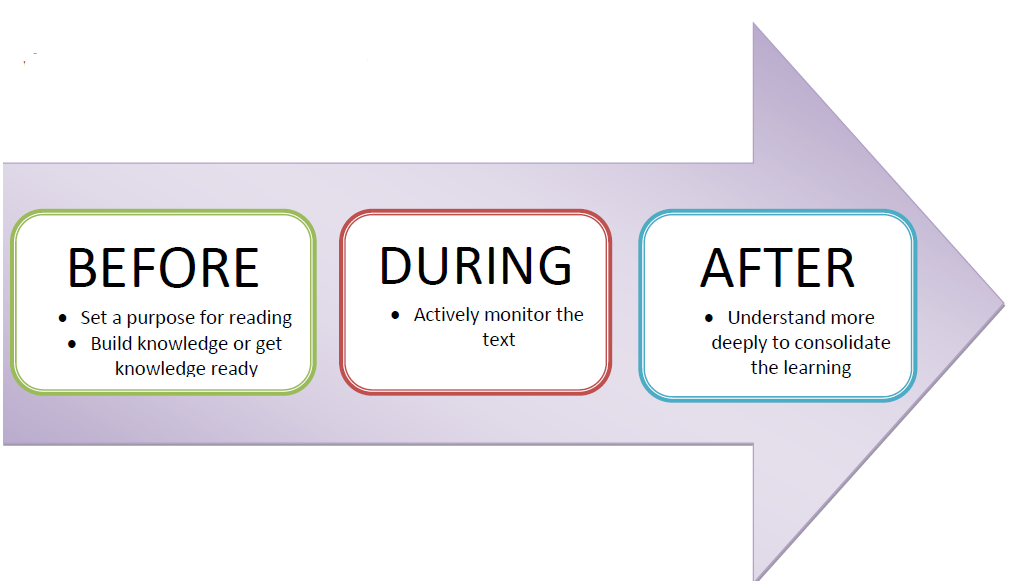Strategies for improving literacy in all subject areas!

Every parent questions the best way to support their child’s literacy journey. The aim of this blog is to provide parents with a resource to help their kids break down the reading process so that they really understand the content. We hope that you will find this useful for all subject areas – after all, literacy is needed in maths, science, geography and so on. These printables are mostly geared to children Year 3/4 upwards.
The ‘Before, During and After’ Process of Reading
From Year 4 and up it is really important that your child knows how to comprehend a wide variety of texts. If your child struggles or is unmotivated, here are some parent tips outlining why it’s important to look at 3 stages of the reading process.

Strategies to use BEFORE reading the text/book
a) Anticipating the text
Before your child reads a book (or starts a new maths/science/history topic), it’s important to activate your child’s prior knowledge. You want to build curiosity about a new topic! Also, you want to stimulate their interest and set a purpose for reading.
Here’s a printable template that you can use with your son/daughter before they start reading.
b) Look at the content
Many kids have great difficulty in jumping into new texts without any background discussion. If a topic is unfamiliar, then it’s hard for a child to make connections. Get them knowledge ready!
Here’s a printable that you might find helpful.
c) A thought-provoking question
This is a great method for trying to create intrigue for your son/daughter. If they are reluctant readers then this might be the hook! Can they think of an interesting, thought-provoking question about the topic/text? Remember that our goal here to get them to want to read the text. Here is one example:
1) If you wrote a book using this cover, what would you name the main character and where would he/she go?
Download more of these in an easy printable here.
Strategies to use DURING reading the text/book
This, of course, may prove difficult if your child reads the book at school. However, if your child struggles with reading or comprehension then you can still assist them. My first tip would be to read the novel yourself and have a copy at home.
a) Working the text
Helping your child go through each chapter will greatly assist in keeping them on task and motivated. Discussion encourages higher order thinking.
Please refer to our earlier article about graphic organisers – they are incredibly helpful. You will also find printables for the Hamburger paragraph, the OREO graphic organiser and more – junk food is a great motivator! Please note that your child should fill in the graphic organiser during the reading of the text.
Strategies to use AFTER reading the text/book
This is where your child’s comprehension is really tested. Schools now assess a wide variety of comprehension skills – not just factual questions. The trick is to ask a few questions, but not work through a bunch of questions after every chapter – that’s not fun. Try to be a bit creative e.g write questions on bits of paper that they choose from a box, make a cardboard dice or spinner featuring a different question on each side, make a simple board game listing a variety of questions. Here are sample some comprehension questions to get you started:
- What is the setting of the story?
- Who is telling the story?
- Did the characters remind you of anyone that you know?
- Did you have a favourite character? Why?
- Can you retell the story?
- How did this book make you feel? Was it a happy book? A bit scary? Adventurous?
- Look at the cover – did it give you any clues about the story?
- What did you like about the book? Did you dislike anything about the book?
- Can you ask me a question about the book that we read?
- Which of your friends would like this book? Why do you think this?
I am passionate about kids reading for pleasure. But I know that it’s a battle for many parents to get their kids to read. Reading comprehension spans across all subject areas which is why it’s such an important skill. Being motivated to read and being enthusiastic about reading has been shown to have a significant impact on the development of kids’ comprehension – so don’t give up!
Check out our blogs for more ideas and tips.
Boys Love LFB – Here’s what they have to say!
Get boys reading in the digital age
Why write? Tips for reluctant writers
Brought to you by Tanya Grambower
